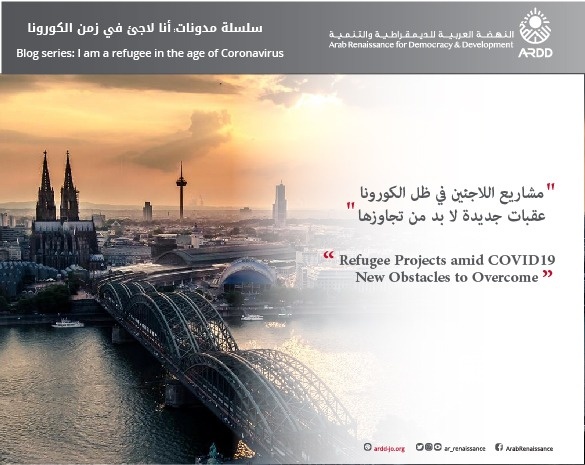Unexpected risks and setbacks are not surprising for refugees trying to rebuild their businesses in host countries; their previous experiences, the loss of their past projects, and having to leave their countries has equipped them with patience and acceptance. However, this does not mean that they do not experience disappointment and despair due to their limited resources for withstanding such economic changes due to successive crises. This situation is extremely challenging, especially for those who were starting to take their first steps towards their goals at the beginning of this year.
The German government has approved rapid initial financial assistance that covers the costs of small projects for a period of three months and can be submitted and obtained in less than eight days, according to the German Chamber of Industry and Trade. Nevertheless, challenges in obtaining this assistance persist.
With the numerous changes in assistance interventions in Germany, the government has tried to reach the largest number of beneficiaries. There have been cases of fraud in the submission of applications in the state of North Rhine, according to the West Germany Media network WDR, has which complicated the aid process. In addition, many emerging projects do not fall under any rescue or aid plans.
Hussam is the owner of a barbershop in Germany. Although he was working as a barber in Iraq; he had to complete a three-year professional training to obtain a certificate qualifying him to open his own shop. Hussam was forced to close his shop because of the lockdown, and he has been unable to receive the government’s aid for owners of small projects because it does not include those who have launched their businesses this year. When he tried to ask about other solutions, he was advised to use the services of a financial expert, which Hussam found funny because the cost of this expert’s consultation to find a solution for his small business is an unaffordable 4,000 euro. When asked whether the Labor Office in Germany could help, Hussam said: “They asked me to try to continuously apply for assistance because what is happening is completely new, and there are constant changes in the laws.”
Mustafa Al-Homsi, the owner of a recently opened grocery store in Cologne, has shared that he can shut down his shop and ask for financial assistance since the store is still new and has no permanent customers, in contrast to bigger stores. However, he has chosen not to close it because he feels that this small project fulfills him. Mustafa says, “I cannot close my shop after feeling overjoyed as I finally stopped needing financial assistance from the State and started my own business.” Mustafa added as Syrians, they are accustomed to challenges, and this will not prevent the continuation of their work as long as it is allowed. Further, Al-Homsi said that although his work does not generate much income, it allows him to communicate with others, which helps him spend his time.
Additionally, some artists who have applied for grants for their art projects do not yet know the fate of these applications, even though their livelihood depends on them. One of the Syrian artists, who preferred not to be named, says that communication about his project – which was approved to be financed by two cultural organizations in Germany and Belgium – has stopped, after he had allocated time needed to the project which could be produced without having to leave the house. Now he cannot work on any part of the project as he is waiting for confirmation from the institution and this delay affects his and his assistants’ incomes. In addition, he is afraid of further bureaucratic complications due to the conditions of the lockdown which may mean a severe blow to him and other artists, writers, and translators in Europe. However, cultural organizations are stepping up currently to help independent artists in this ordeal by providing them with Federal Government support. Several Arab organizations have also allocated support projects for artists, or modified their programs to provide legal aid and support. For example, the Nawras and Itijahat Cultural foundations launched the Sanad Program, a legal aid and support program aimed to support Arab cultural workers and artists in Germany.


